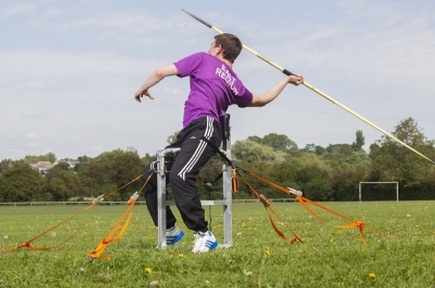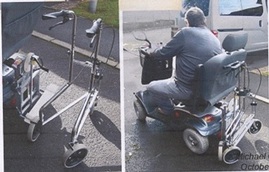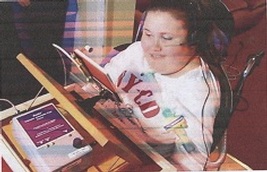Innovative aids transform the lives of people with disabilities
An enterprising charity run entirely by volunteers has helped thousands of disabled people reach new levels of independence through the creation of specially engineered equipment.

The charity Remap works through a nationwide network of dedicated volunteers, many of whom are engineers. They use their ingenuity and skills to help people with disabilities to achieve much-desired independence in some aspect of their lives, or to enjoy leisure opportunities previously closed to them.
Each and every piece of equipment made by Remap is a one off, specially created with the individual’s needs in mind.
Whether it’s a pill dispenser for a person with severe Parkinson’s who needs help in taking tablets during the night without waking his carer or a cooking pan stabilizer that enables a person who has lost the use of her right hand owing to a series of strokes to continue cooking for her family, Remap uses inventiveness, experience and often recycled materials to produce solutions to problems so that people can experience a better quality of life.
Remap chief executive Adam Rowe says: “We help people of all ages and all conditions – we have helped more than 100,000 people since we started and last year we built equipment for no fewer than 3,500 people. “There are no medical conditions that we cannot cater for. We regard everything as a challenge and focus on building solutions. Ninety per cent of the time we are able to do it, thanks to the ingenuity of the volunteer engineers we have on board.”
Half century of innovation
Remap has indeed just celebrated its golden anniversary. It was originally started 50 years ago by an ICI engineer, Pat Johnson, whose sister had had polio. He wanted to help her lead a more independent life – and thanks to his engineering skills was able to do so. His sister was confined to a wheelchair, but had upper body movement, and was delighted with her brother’s creation of an electric hoist, with a runway, above the ceiling in the hallway, bathroom and toilet of her bungalow that enabled her to enjoy a greater level of independence than ever before.
From there on other engineers became involved and Remap grew until it covered the UK. There are now 80 groups, or ‘panels’ as they are known, that are mainly made up of dedicated volunteer engineers and craftspeople who may have metalwork, carpentry or electronic skills. They work very closely with occupational therapists who provide many of the referrals, the rest coming from clients themselves and other charities. No charge is made for any equipment made.
Recent challenges
According to Mr Rowe, one of the most complicated pieces of equipment that has been made by Remap in recent times is what is essentially a hydraulic forklift for the kitchen to assist a client with multiple sclerosis. She has a titanium insert in her hip which effectively means that she can’t bend any more, and since she lives alone as well, many everyday household tasks are an impossibility without help.
Now her compact ‘fork lift truck’ helps her lift loads from the ground floor level to kitchen worktop level and will transport loads anywhere inside or outside her house. She can now comfortably and confidently lift and transport loads such as her wet washing and recycling materials; she can also safely take hot dishes of food to and from her oven and lift them to and from her kitchen worktop. Her quality of life has improved immeasurably.

One problem many disabled people with mobility problems face is the difficulty of getting around in public places. One Remap client uses a three-wheel rollator indoors and a large electric scooter outdoors. The scooter is too large to take into shops and since he is unable to walk at all without his rollator, he needed a way to carry the rollator on his scooter, but is unable to lift it onto a fixed bracket. The clever Remap solution was to build a purpose built frame with pulleys that the client could easily use to upload and download the rollator as and when he needed it.
Another lady had a particular mobility problem, owing to a brain tumour, that prevented her from ascending a very steep step at the building’s entrance. A power step proved to be the answer that lifts or lowers her as necessary. Now that further improvements to the internal stairs have also been carried out, she is able to leave and return to her home unaided. She is particularly delighted that she no longer has to contemplate moving to alternative accommodation.

But perhaps the Remap project guaranteed to give a warm glow is the smile operated e-reader. Becky is a quadriplegic girl on tracheostomy ventilation and needs 24-hour care at home. Her mother asked Remap whether it could mount an e-reader device in front of Becky, that would give her some much needed independence by allowing her turn the pages herself. Remap’s solutions was to create a device whereby Becky’s smile would turn the pages.
In essence, a sensitive resistive sensor was mounted just above Becky’s cheek which detected any slight upward movement of her cheek and this signal set off a small motor that turned the page. The biggest problem thereafter was then to stop Becky smiling! Such a device gave her a much welcomed sense of independence from her carers who normally do everything for her.
Neverending list
The Remap list of projects goes on and on. A throwing chair that enables an athlete with cerebral palsy to take part in world-class discus competitions, an ingenuous device that helps a disabled photographer change the backdrops in her studio effortlessly, electric dressing aids and heated trousers, powered drinking aids, extended door handles, a cricket bat prosthetic and an arm support for a harp player with neck and shoulder problems. There have after all been more than 100,000 projects.
As for the future, Mr Rowe is keen to help even more people. “I’d like to get the numbers up to 4,000 per year in the next few years.” He’s also looking for new volunteers to help create the equipment and, of course, a donation would be more than welcome to this charity that relies entirely on volunteers and donations.
For more information on Remap see www.remap.org.uk/
Latest Features News
 28-Nov-19
2019 Election: Labour pledges £10.8 bn for free personal care while Boris Johnson sidelines social care
28-Nov-19
2019 Election: Labour pledges £10.8 bn for free personal care while Boris Johnson sidelines social care
 18-Oct-19
Podcast: Wendy Mitchell and dementia: 'My biggest fear is not knowing who my daughters are'
18-Oct-19
Podcast: Wendy Mitchell and dementia: 'My biggest fear is not knowing who my daughters are'
 30-Sep-19
World's oldest diver aged 96 says 'never accept the fact you are getting old'
30-Sep-19
World's oldest diver aged 96 says 'never accept the fact you are getting old'
 27-Sep-19
Exclusive: Care minister backs care workers' call for time off to grieve and attend funerals
27-Sep-19
Exclusive: Care minister backs care workers' call for time off to grieve and attend funerals
 20-Sep-19
Podcast: Gyles Brandreth urges care workers to learn poetry with elderly
20-Sep-19
Podcast: Gyles Brandreth urges care workers to learn poetry with elderly